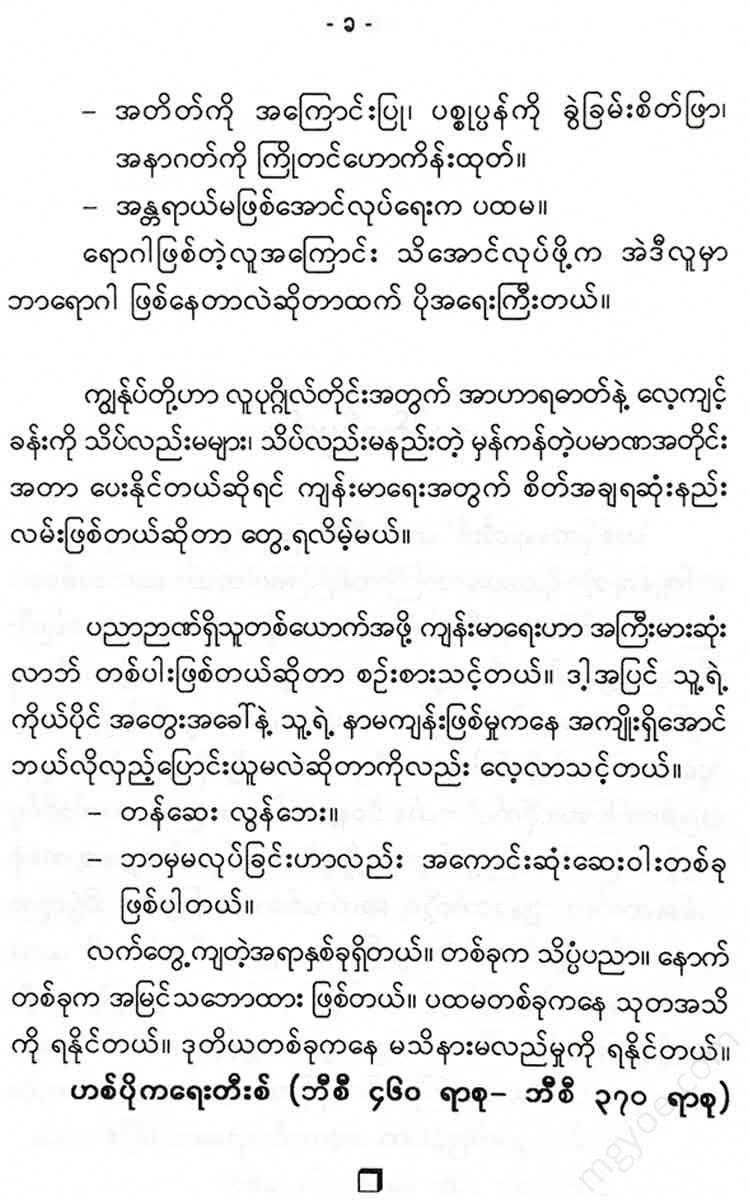စိတ်ကူးချိုချိုစာပေ
Aung Aye (Yangon University) - Short tips for long life and health
Aung Aye (Yangon University) - Short tips for long life and health
Couldn't load pickup availability
Introduction
(The power of prevention)
At least twice a week, I tell a patient that I have no more weapons to fight his or her cancer. The disease is advanced, and most patients are nearing the end of their lives. I say this because I have a duty to tell them. With a few notable exceptions, the state of cancer care today is no different than it was fifty years ago. What is even more infuriating is that many of my patients have found that their cancer or other life-changing illness could have been prevented if they had done something about it earlier in life. It is even more heartbreaking to talk about it. I would say that most people could have prevented or accelerated the onset of many of the diseases we see today. Not cancer. Not heart disease, not kidney disease, not stroke, not obesity, not diabetes, not diabetes, not hypertension Diabetes, autoimmune diseases, dementia, and other neurological disorders are all preventable diseases. If they adopt some healthy habits early on, they can avoid the risk of developing the disease.
The best way to fight cancer, and all other diseases, is to prevent them. It's surprising to see that 7 out of 10 Americans die each year from the chronic diseases I mentioned above. Heart disease, cancer, and stroke account for more than 50 percent of all deaths each year. Now, nearly half of us are living with chronic diseases.
But the topic of “prevention” is also a difficult one to talk about. Readers, think back to yourself for a moment. Can you think back to 20 years ago, 30 years ago, or 40 years ago? Whatever we are living today, it is because of the actions we have taken in the past. I see that in the eyes of my patients every day.
I can't do anything more than what I do. Think about our world, where we all die as we get older. Our bodies are on the verge of decay. It's a lot like an old car that's been driven for thousands and thousands of miles. One day, the engine will stop starting and there's no way to replace it. In the United States, there were even obituaries that listed deaths as due to old age. But those obituaries didn't appear much after 1951. After that, the majority of obituaries listed the cause of death as a disease or an injury or a combination of diseases. I am amazed at this situation because we live in a world where technology is so advanced and knowledge about how to live a healthy life is so widely available, yet we still cannot prevent the scourge of disease. It is rare to hear of someone living to the age of 99 and dying peacefully. Instead of hearing such stories, we hear of people who have suffered from a chronic disease and who have given up after a long battle with it.
In our age of information technology, where health advice is distributed like candy from the “media,” health information has become more complex. It’s become a situation where we have to think about the pros and cons for ourselves. We are bombarded with expert advice on how to sit and stand, news reports filled with the latest scientific findings, best-selling books that expose theories or government-approved topics, advertisements that promote brands, and the words of our own doctors. But all of this advice is so general that the contradictions are so general. One day, you read a new study that suggests that multivitamins are effective in preventing cancer, and the next day, you read another study that suggests that multivitamins increase the risk of cancer and are not good for heart health. (What's worse is that I found out that the pharmaceutical company that makes and sells vitamins and the pharmaceutical company that makes and sells cancer drugs are the same company.)
The purpose of my first book, “The End of Suffering,” is simple. I share what I’ve learned while working on the edge of the battle against cancer. I work in a place where people are developing and testing drugs to help them live longer. While the death rate from cancer has remained flat over the past 50 years, other diseases have made significant advances that can be treated or even eradicated with just a few simple discoveries. Statins have been discovered to prevent cardiovascular disease and stroke , and antibiotics to fight bacterial infections . We have also learned more about the risks posed by behavioral factors such as smoking, poor diet, or overeating. Despite these advances, why haven't we made progress in treating chronic, debilitating diseases that have multiple causes?
For decades, we have tried to narrow our understanding of the body and the specific causes of its severe damage. We have considered it as a genetic mutation, a virus, a deficiency of a certain element, or a measure of white blood cell count, glucose level, or triglycerides . When we narrow our view, our perspective has become narrower. Our views on how to care for our bodies have not changed, and we have not been able to discover new treatments. The original title of the book “The End of Disease,” a guide to living, was “What is Health?” That question has plagued me and my colleagues to this day. I don’t know what real health is. We measure “health”

















